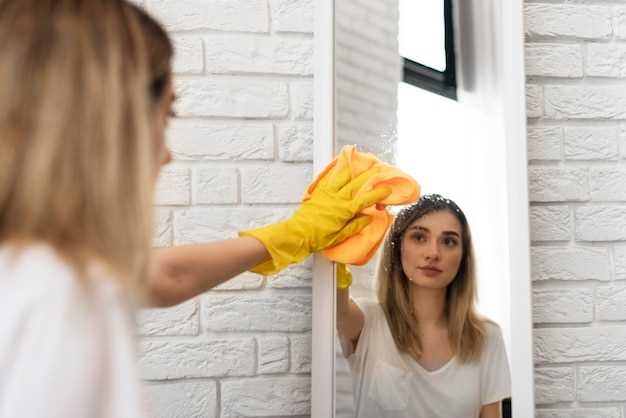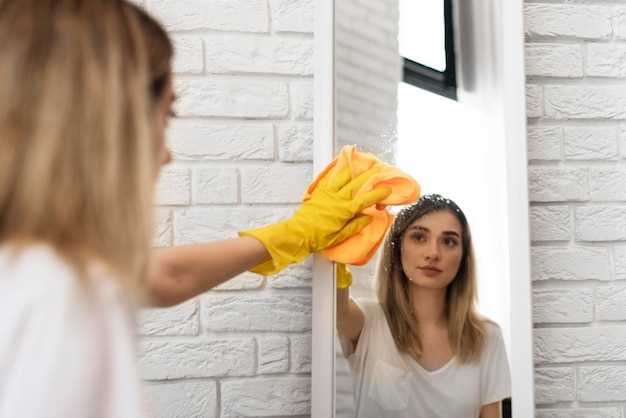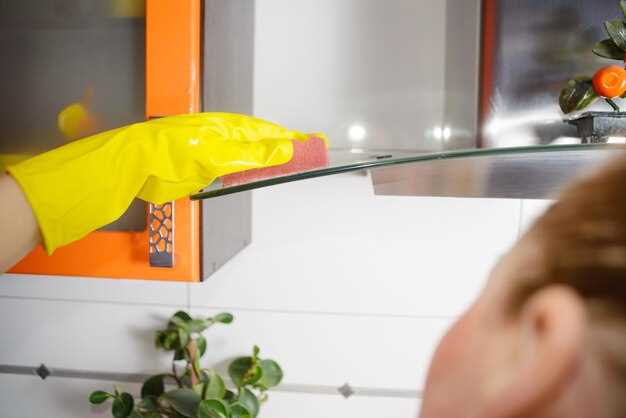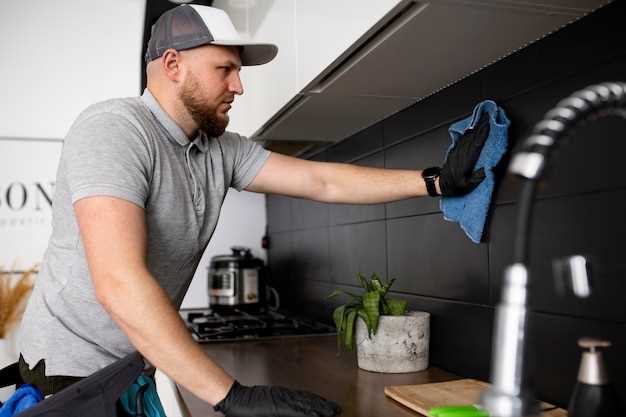

When it comes to the upkeep of your glass surfaces, ensuring their longevity and pristine appearance is of utmost importance. Glass, with its transparent and delicate nature, requires special attention and care to maintain its clarity and shine. Whether it’s the windows of your home, the glass tabletops, or even the mirrors in your bathroom, following essential tips for cleaning and care will not only enhance their aesthetic appeal but also prolong their lifespan.
Preserving the Transparency: Glass surfaces are renowned for their ability to let light pass through, creating an illusion of space and openness. However, over time, these surfaces can accumulate dirt, dust, and smudges, diminishing their transparency. To combat this, regular cleaning with non-abrasive cleaners is crucial. Opt for mild solutions or homemade remedies, such as a mixture of vinegar and water, to gently remove any grime without causing damage.
Shielding Against Scratches: Glass surfaces are susceptible to scratches, which can mar their smoothness and clarity. To prevent this, it is essential to handle glass objects with care and avoid using abrasive materials during cleaning. Soft microfiber cloths or sponges are ideal for wiping down glass surfaces, as they minimize the risk of scratches. Additionally, consider placing protective mats or coasters under glass objects to prevent direct contact with hard surfaces.
Defying Streaks and Smears: One of the most common challenges when cleaning glass surfaces is the appearance of streaks and smears. These unsightly marks can be frustrating to remove and can even make the glass appear dirtier than before. To combat this, it is advisable to use lint-free cloths or newspapers when drying glass surfaces after cleaning. Their absorbent properties and lack of fibers will ensure a streak-free finish, leaving your glass surfaces sparkling and clear.
Choosing the Right Cleaning Products
When it comes to maintaining the cleanliness and shine of your glass surfaces, selecting the appropriate cleaning products is crucial. The right choice of cleaning solutions can make a significant difference in achieving optimal results without causing any damage or streaks.
One of the key factors to consider when choosing cleaning products for your glass surfaces is their compatibility. It is important to select products that are specifically designed for glass cleaning, as they are formulated to effectively remove dirt, grime, and fingerprints without leaving behind any residue or streaks.
Another aspect to keep in mind is the type of glass surface you are cleaning. Different glass surfaces may require different cleaning products. For example, if you are cleaning windows, you may need a product that is suitable for outdoor use and can effectively remove tough stains caused by environmental factors such as pollution or hard water deposits.
Additionally, it is essential to consider the safety of the cleaning products you choose. Opt for products that are non-toxic and environmentally friendly to ensure the well-being of both yourself and the environment. Look for labels indicating that the product is free from harsh chemicals such as ammonia or bleach.
Furthermore, it is advisable to read and follow the instructions provided by the manufacturer of the cleaning products. This will help you understand the proper usage and dilution ratios, ensuring that you achieve the best results while avoiding any potential damage to your glass surfaces.
- Choose cleaning products specifically designed for glass surfaces.
- Consider the type of glass surface you are cleaning.
- Opt for non-toxic and environmentally friendly products.
- Read and follow the manufacturer’s instructions for proper usage.
By carefully selecting the right cleaning products for your glass surfaces, you can maintain their clarity, shine, and longevity, ensuring they remain a beautiful and functional part of your space.
Proper Techniques for Cleaning Glass
When it comes to maintaining the clarity and shine of glass surfaces, employing the correct cleaning techniques is essential. By following these proper methods, you can ensure that your glass remains spotless and free from streaks, without causing any damage or scratches.
1. Gather the Right Tools
Before you begin cleaning your glass surfaces, it is important to gather the necessary tools. A lint-free microfiber cloth, a squeegee, a bucket of warm water, and a mild glass cleaner are all essential items for achieving optimal results.
2. Start with Dusting
Prior to applying any cleaning solution, it is crucial to remove any dust or loose particles from the glass surface. Use a dry microfiber cloth or a soft brush to gently dust the surface, ensuring that all debris is removed.
Once the surface is dust-free, dampen the microfiber cloth with the glass cleaner solution. It is important to avoid using excessive amounts of liquid, as this can lead to streaks and smudges. Instead, lightly mist the cloth and then proceed to wipe the glass in a circular motion.
For larger glass surfaces, such as windows or glass tabletops, a squeegee can be used to achieve a streak-free finish. Start from the top and work your way down, using smooth and even strokes.
Remember to pay attention to the edges and corners of the glass, as these areas tend to accumulate dirt and grime. Use a cotton swab or a soft toothbrush to clean these hard-to-reach spots effectively.
Finally, once the glass is clean and dry, inspect it for any remaining streaks or smudges. If necessary, repeat the cleaning process using a fresh microfiber cloth and a minimal amount of cleaning solution.
By following these proper techniques for cleaning glass, you can maintain the pristine appearance of your glass surfaces and enjoy their clarity for years to come.
Removing Stubborn Stains and Spots
When it comes to maintaining the cleanliness and appearance of your glass surfaces, it is essential to address stubborn stains and spots that may mar their beauty. These blemishes can be particularly challenging to remove, requiring special attention and care. In this section, we will explore effective techniques and solutions for tackling stubborn stains and spots on your glass surfaces.
Identifying the Stain or Spot
Before attempting to remove a stubborn stain or spot from your glass surface, it is crucial to identify the nature of the blemish. Different stains and spots may require different cleaning methods and products. For instance, hard water stains, fingerprints, or grease marks may each necessitate a unique approach. By understanding the specific stain or spot, you can choose the most appropriate cleaning solution and technique.
Effective Cleaning Techniques and Solutions
Once you have identified the stain or spot on your glass surface, it is time to employ effective cleaning techniques and solutions. Here are some tried-and-tested methods:
| Stain or Spot | Cleaning Technique | Cleaning Solution |
|---|---|---|
| Hard Water Stains | Vinegar and water solution | Mix equal parts of white vinegar and water. Apply the solution to the stain and let it sit for a few minutes. Scrub gently with a non-abrasive sponge or cloth. Rinse with clean water and dry with a lint-free cloth. |
| Fingerprints | Isopropyl alcohol | Dampen a cloth or paper towel with isopropyl alcohol. Gently wipe the fingerprints, applying light pressure. Repeat if necessary. Dry with a lint-free cloth. |
| Grease Marks | Dish soap and warm water | Mix a few drops of dish soap with warm water. Apply the soapy solution to the grease marks and scrub gently with a sponge or cloth. Rinse with clean water and dry with a lint-free cloth. |
Remember to always test any cleaning solution on a small, inconspicuous area of the glass surface before applying it to the entire stain or spot. Additionally, avoid using abrasive materials or harsh chemicals that may scratch or damage the glass.
By following these effective techniques and using the appropriate cleaning solutions, you can successfully remove stubborn stains and spots from your glass surfaces, restoring their pristine appearance and ensuring their longevity.
Preventing Scratches and Damage
Preserving the pristine condition of your glass surfaces requires taking proactive measures to prevent scratches and damage. By implementing a few simple practices, you can ensure the longevity and beauty of your glass surfaces without compromising their functionality.
1. Use Soft and Non-Abrasive Cleaning Tools

When cleaning your glass surfaces, it is crucial to choose cleaning tools that are soft and non-abrasive. Avoid using rough materials such as steel wool or abrasive sponges, as they can leave scratches on the glass. Instead, opt for microfiber cloths or soft cotton towels to gently wipe away dirt and grime.
2. Avoid Harsh Chemicals
Harsh chemicals can not only damage the glass but also leave behind streaks and residue. It is advisable to steer clear of ammonia-based cleaners, bleach, or any other abrasive substances. Instead, opt for mild, non-acidic cleaning solutions specifically formulated for glass surfaces. These products will effectively clean the glass without causing any harm.
3. Lift, Don’t Drag
When moving objects across glass surfaces, it is important to lift them instead of dragging or sliding. Dragging heavy items can cause scratches and even cracks on the glass. Use coasters or felt pads under furniture legs to prevent direct contact with the glass surface. Additionally, avoid placing sharp or rough objects directly on the glass to minimize the risk of scratches.
4. Regular Maintenance
Regular maintenance is key to preventing scratches and damage on glass surfaces. Make it a habit to clean your glass surfaces regularly to remove dirt and debris that can potentially cause scratches. Additionally, inspect the glass for any signs of damage or wear and address them promptly. By staying proactive and addressing any issues early on, you can prevent further damage and maintain the integrity of your glass surfaces.
- Choose soft and non-abrasive cleaning tools
- Avoid harsh chemicals
- Lift objects instead of dragging
- Regularly clean and inspect your glass surfaces
By following these preventative measures, you can keep your glass surfaces looking pristine and extend their lifespan. Taking the time to care for your glass surfaces will not only enhance their visual appeal but also ensure their durability for years to come.
Regular Maintenance for Long-lasting Glass
Ensuring the longevity of your glass surfaces requires consistent and proper care. By implementing regular maintenance practices, you can keep your glass looking pristine and extend its lifespan. This section will provide you with essential tips and techniques to maintain your glass surfaces effectively.
1. Routine Cleaning: Regularly cleaning your glass surfaces is crucial for preventing the buildup of dirt, dust, and grime. Use a gentle glass cleaner or a mixture of vinegar and water to remove any smudges or stains. Avoid using abrasive materials or harsh chemicals that can damage the glass.
2. Protective Measures: Taking preventive measures can significantly contribute to the long-lasting quality of your glass. Consider applying a protective coating or film to your glass surfaces to guard against scratches and UV damage. Additionally, using coasters or mats under glassware and avoiding placing heavy objects on glass surfaces can help prevent accidental damage.
3. Regular Inspections: Periodically inspect your glass surfaces for any signs of damage or deterioration. Look for chips, cracks, or loose edges that may require immediate attention. Addressing these issues promptly can prevent further damage and ensure the longevity of your glass.
4. Proper Handling: When handling glass surfaces, it is essential to exercise caution and care. Avoid applying excessive pressure or force when cleaning or moving glass objects. Use both hands to lift and carry glass items to minimize the risk of dropping or shattering them.
5. Avoiding Extreme Temperatures: Glass is sensitive to extreme temperatures, which can cause it to expand or contract, leading to cracks or breakage. Avoid placing hot objects directly on glass surfaces and protect them from prolonged exposure to direct sunlight or extreme cold.
6. Regular Maintenance Schedule: Establishing a regular maintenance schedule for your glass surfaces can help you stay organized and ensure that they receive the necessary care. Set reminders for cleaning, inspections, and any additional maintenance tasks to keep your glass surfaces in optimal condition.
By following these regular maintenance practices, you can preserve the beauty and functionality of your glass surfaces for years to come. Remember to always handle glass with care and seek professional assistance for any significant damage or repairs.
Special Considerations for Different Types of Glass

When it comes to caring for and cleaning glass surfaces, it’s important to keep in mind that different types of glass may require special considerations. Understanding these differences can help you maintain the beauty and longevity of your glass surfaces without causing any damage or compromising their integrity.
One important factor to consider is the type of glass you are dealing with. For instance, tempered glass, which is often used in shower doors and windows, is designed to be stronger and more resistant to breakage. However, it can still be susceptible to scratches if abrasive cleaners or tools are used. On the other hand, laminated glass, commonly found in car windshields, is made up of multiple layers with a plastic interlayer, making it more resistant to shattering. However, it may require special care to prevent delamination or damage to the interlayer.
Another consideration is the presence of coatings or treatments on the glass surface. Some glass surfaces may have a protective coating, such as an anti-reflective coating or a hydrophobic coating, which can enhance their performance and durability. It’s important to use gentle cleaning methods and avoid abrasive materials that can scratch or remove these coatings. Additionally, certain types of glass, such as stained glass or frosted glass, may require specialized cleaning techniques to preserve their unique appearance.
Furthermore, the location and purpose of the glass surface can also impact the care and cleaning required. For example, glass surfaces exposed to high levels of sunlight, such as windows or glass tabletops, may require more frequent cleaning to remove fingerprints, smudges, and UV damage. Glass surfaces in high-moisture areas, such as bathrooms or kitchens, may require extra attention to prevent the buildup of mold or mineral deposits.
Overall, understanding the specific considerations for different types of glass can help you maintain their beauty and functionality for years to come. By using appropriate cleaning methods, avoiding abrasive materials, and considering the unique characteristics of each glass surface, you can ensure their longevity and enjoy their clarity and shine.